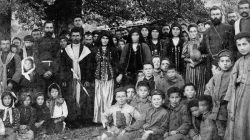
Makhackala/Agency Caucasus – Objection arose from Dagestan against a court ruling to blacklist Said-i Nursi’s books across the Russian Federation because of its alleged support for extremism.
Groups of people gathered in Dagestan’s capital Makhackale to start a petition against the banishment of Said-i Nursi’s books.
The petitioners said that Risale-i Nur does not contain anything to make it a book of ‘extremism’ after they got up their petition on the morning of December
The Koptevskaya Court of Jurisdiction in Moscow ruled in September that Risale-i Nur, a 14-volume work by Said-i Nursi, served the purpose of radical Islamic movements and banned its publication in agreement with the opinion of a group of experts as members of the Russian Sciences Academy that came after the Chief Tatar Prosecutor filed a lawsuit for a second time. Officials of the Nur-i Badi Foundation, which had the work of Risale-i Nur translated into Russian, said in a statement that they would appeal to the European Court of Human Rights.
The Chief Tatar Prosecutor banned the publication of books by Said-i Nur after an investigation into the institutions related with the Nur religious society was completed in 2005. The lawsuit against the publication of Risale-i Nur came in 2006 from the same Tatar prosecutor. The lawsuit was later dropped when several Muslim leaders in Russia objected against it. KU/ÖZ/FT








